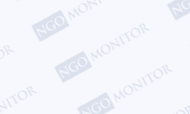Press Release:
NGO Funding at Center of Israeli Debate
Ministers Address Secret European Funding for Politicized Organizations
JERUSALEM – In the ongoing efforts to address the concerns resulting from massive foreign government support for politicized non-governmental organizations (NGOs) operating in Israel, the Ministerial Legislation Committee today agreed to proceed with the proposed NGO Funding bill by MK Tzipi Hotovely (Likud) and MK Ofir Akunis (Likud). NGO Monitor, a Jerusalem-based research institution, notes that this and similar proposals reflect the broad concerns among Israelis regarding massive and secretive European government funding for what are presented as “non-governmental” organizations.
“Instead of presenting and defending their disagreements with Israeli policy in public, according to accepted diplomatic procedures, the EU and individual European governments seek to exert pressure via massive funding for highly politicized Israeli NGOs,” says Prof. Gerald Steinberg, president of NGO Monitor. “The activity of these NGOs largely takes place outside of Israel, through lobbying and campaigning in the UN, legal bodies, and college campuses. This has created a self-fulfilling prophecy – the more that Europe seeks to prevent the Israeli debate on the impact of these NGO campaigns that it funds, the more resentment this creates among the public, resulting in more legislative initiatives.”
As NGO Monitor has detailed, the extreme lack of transparency in European government funding processes for Israeli NGOs is itself undemocratic.
Steinberg adds, “Today’s cabinet debate, including the strong objections to the proposal, reflects the importance and complexity of the issues, as well as the robustness of Israeli democracy. This will continue to be demonstrated in future Knesset hearings, debates about legislation, and the votes of Israel’s elected officials.”
NGO Monitor also notes that in February 2011 the Knesset adopted the NGO Funding Transparency Law (MK Ze’ev Elkin – Likud). The objective of this law is to provide Israeli democracy and civil society with the information necessary to assess and debate the extent and impact of secret foreign government funding for a narrow group of politicized NGOs.
“We are just now beginning to see the impact of this law,” says Steinberg. “In contrast to the extreme secrecy of the EU and other governments, the Netherlands, the UK, Sweden, and Switzerland have begun to review and, in some cases, end funding to certain NGOs. Thus, rather than seeking new legislation and creating a backlash, the existing NGO Funding Transparency Law should be fully implemented and followed-up with substantive evaluations of effectiveness.”
“However, as long as European governments continue to provide massive funding in secret processes for politicized NGOs, Israel’s elected representatives will respond to strongly held public concerns. The ongoing politicization is part of the normal democratic process, and issues related to funding for politicized NGOs are not exempt.”

